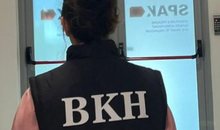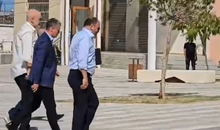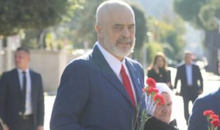
 Flash News
Flash News
What are the new sanctions that the EU is preparing against Russia?

On May 8, the European Commission presented to the ambassadors of the member states of the European Union a new round of sanctions against Russia and Belarus. The proposal, seen by Radio Free Europe, is surprisingly ambitious, considering that the bloc has passed a series of weak sanctions packages in the past.
The key question now is whether the measures, if adopted, will retain their weight. Since the measures must be adopted unanimously, there is a risk that they will be weakened. Unsurprisingly, the proposed measures affect Russian energy, a sector that has not been affected since the EU managed to impose a near freeze on Russian oil imports in 2022 after months of diplomatic disagreements. This time, the European Commission has proposed to sanction Russian liquefied natural gas (LNG).
However, the proposed sanctions do not suggest a ban on direct imports to the EU, which account for around 5 percent of the bloc's energy consumption and could be replaced immediately, according to EC estimates. Instead, a gradual approach is being suggested, banning shipping, meaning EU countries would not be allowed to re-export Russian LNG and therefore Russian ships would be forced to make longer journeys gas to reach the final destination.
There is also a moratorium on investment or provision of services for major Russian LNG infrastructure projects under construction: Arctic LNG and Murmansk LNG. Major states such as Germany, France and Italy have already asked for an assessment of what impact the LNG-related measures would have if they were passed, suggesting member states are uneasy about the move.
Another issue that could be tricky to get the green light from EU member states is the proposal to ban the import of helium. So far, helium imports from Russia to the EU are worth only $1 billion a year, but Russia has ambitions to become one of the world's largest helium suppliers in the future.
In the proposal, there is also an attempt to extend liability for breaching sanctions to EU partner companies outside the bloc, which could be too big a step for EU member states, as they argue it is too complicated to track whether all the measures imposed by Brussels are respected and that this would be a very big burden for companies.
But what else does the EC proposal include? There is also the ban on the use of the Financial Message Transfer System (SPFS), a type of SWIFT system based in Moscow, which should be approved, although Hungary has expressed reservations.
Pastaj edhe ka gjëra që duken se mund të miratohen lehtë, por potencialisht mund të mos pranohen nga shtetet anëtare. Një prej tyre ka të bëjë me kufizimin e përdorimit dhe transferimit në Rusi të të drejtave të varieteteve bujqësore, që u japin fermerëve kontrollin ekskluziv për mbjelljen, korrjen, shitjen, eksportin dhe importin e llojeve të caktuara. Për këtë gjë, shqetësim kanë shprehur Franca dhe Portugalia, duke argumentuar se një veprim i tillë mund të çojë në mungesë të ushqimit në botë.
Po ashtu do të jetë interesante të shihet nëse ndalesa e propozuar ndaj financimit shtetëror rus për partitë politike me bazë në BE, fondacionet, institutet, organizatat joqeveritare dhe ofruesit e shërbimeve mediale në bllok do të hiqet. Disa shtete, veçmas Hungaria dhe Sllovakia, gëzojnë raporte të ngushta me Kremlinin dhe mund të mos kenë vullnet ta miratojnë një ndalesë të tillë. Të tjerët, sikurse Holanda dhe Suedia, kanë kufizime kushtetuese sa i përket ndërhyrjes së shtetit në financimin e mediave dhe organizatave të shoqërisë civile.
Propozimi për ndalimin e blerjeve të mallrave kulturore ukrainase nëse ato dyshohen se janë mallra që ilegalisht janë larguar nga Ukraina, pritet të miratohet pa problem. Po ashtu përpjekja për të ndaluar operimin në BE të kompanive të transportit, kur 25 për qind e pronësisë së tyre është në duart e rusëve, po ashtu pritet të miratohet. Kjo masë është më e drejtpërdrejtë se status quo-ja, ku kompanitë mund të bllokohen nëse rusët kanë shumicën e aksioneve të tyre. Masat që godasin flotën “në hije” të Moskës – anijet që kanë pronësi të paqartë, të cilat Moska i përdorë për të shmangur ndalesën e transportit të naftës në bllok – po ashtu pritet të miratohet.
Po ashtu pritet që të propozohet ndalimi i transmetimit të rrjetit propagandues prorus, Voice of Europe, agjencisë shtetërore të lajmeve RIA Novosti, gazetave ruse Izvestia dhe Rossiiskaya. Nëse vendoset një masë e tillë, këto katër kompani do të vendoseshin në listën e njëjtë të zezë të BE-së ku gjenden RT dhe Sputnik. Kjo nënkupton që qytetarët e BE-së nuk mund të kenë qasje në produktet mediale të këtyre mediumeve, por korrespondentët nga këto kompani do të kenë të drejtë të raportojë nga shtetet e bllokut. Një vendim i tillë mund të merret ndaras nga ambasadorët e BE-së kur ata të mblidhen sërish në Bruksel më 15 maj.
Po ashtu ka sugjerime për ngrirje të aseteve dhe vendosje të ndalesave të udhëtimeve ndaj dy personave të lidhur me Voice of Europe: Artem Marchevskiy dhe Viktor Medvedchuk. Në propozim thuhet se “Marchevskiy ka përdorur Voice of Europe si mjet për kanalizimin e burimeve të papërcaktuara financiare për shpërblimin e propaganduese dhe për të ndërtuar një rrjet ndikimi që e lidhë Medvedchukun dhe bashkëpunëtorët e tij me përfaqësuesit e partive politike në Evropë”.
As always, some interesting things are proposed. A ban on Russian aircraft flying over EU territory came into effect shortly after the start of the Russian invasion of Ukraine in February 2022. Since then, Russian travelers have used creative ways to circumvent the measure, using countries such as Armenia , Georgia and Turkey, or hiding who is behind the flight companies.
Now, the European Commission is proposing to strengthen this measure, adding the requirement that flight operators disclose the owner of the aircraft and the nationality of the passengers. However, there is an exception in this regard. The exception to such a requirement is proposed to be made in cases where aircraft have less than four seats. But such an exemption appears to be ideal for small private jets used by wealthy Russians.
Next is the case of Belarus. The EC is proposing measures for Minsk that have already been adopted for Russia. This includes, among others, bans on imports of marine navigation components, diamonds, gold and coal. Also, it is proposed to ban the provision of some information technology services to Belarus.
Another important exception has also been suggested: the possibility of allowing Belarusian potash – used for artificial fertilizers in agriculture – to be shipped through the EU to food-insecure third countries. Until now, Belarusian potash has been banned and will continue to be banned, but now a suggestion has been made that an annex to the document could be adopted, in which the names of third countries, which are at risk, could be added to case that in the future they have a lack of potassium. The Baltic states are opposed to such a move, arguing that it would reward Alyaksandr Lukashenkas' regime and force them to allow transit of Belarusian products through their countries. Other countries, such as Italy, Portugal and Spain, have objected, saying the EU must do more to avoid accusations that it is causing global food shortages and that such an annex is a last resort and a solution. good. Taken from REL
Latest news


Fiscal peace, but at a cost
2025-07-05 18:00:10
'Bankers' tax evasion, Chinese CEO and former director jailed
2025-07-05 17:39:21
Kyle Walker joins English club on two-year deal
2025-07-05 17:20:24
Two cars collide on the Saranda-Delvina axis, 4 injured
2025-07-05 17:05:29
Touching gesture! Liverpool will pay Jota's family's salary until 2027
2025-07-05 16:45:18
The zodiac signs that cheat most often
2025-07-05 16:25:53

"I asked for the dismissals", Dredha tries to soften Rama's 'blow' in Vlora
2025-07-05 15:48:49
Bomb threat in Parliament, prosecutor: It was a lie
2025-07-05 15:22:28

Bardhi: The recount revealed how greedy Zeqine Balluku is in stealing
2025-07-05 14:44:29
Knife wound on the secondary road Tirana-Durrës, perpetrator sought
2025-07-05 14:37:54
Tears and pain, Diogo Jota is escorted to his final home
2025-07-05 14:21:34
Success starts with yourself! Simple ways to invest in personal development
2025-07-05 13:58:50
Unlicensed firearms found in apartment, 50-year-old arrested in Lushnje
2025-07-05 13:43:11

Tirana Court remands Skerdi Sina to prison
2025-07-05 12:59:34
Cocaine laboratory in Greece, here are the Albanians arrested and wanted
2025-07-05 12:40:16
Directed Justice/Vangjeli: SPAK does not investigate any scandal involving Rama
2025-07-05 12:22:03

Bomb alert, Police remove MPs and media from Kosovo Parliament building
2025-07-05 11:48:16
"The will of the people" and the irony of ordered resignations
2025-07-05 11:32:05
Summer drowning risk: How to enjoy the water without risking your life
2025-07-05 11:20:27
Fire situation in the country, 16 fires reported in 24 hours, 4 still active
2025-07-05 11:07:04
Car hits pedestrian at white lines, injured in serious condition in Vlora
2025-07-05 10:59:58
Mosquito-borne diseases are a growing problem in Europe
2025-07-05 10:44:13



One of Sweden's most dangerous and wanted criminals arrested in Turkey
2025-07-05 09:38:29
Foreign exchange/ How much foreign currencies are bought and sold today
2025-07-05 09:18:38

"Don't be influenced by the opinions of others", today's horoscope
2025-07-05 08:40:50

Morning Post/ In 2 lines: What mattered yesterday in Albania
2025-07-05 08:02:07

Trump says he's ready to raise tariffs to 70% on some countries
2025-07-04 22:35:52
Tre shenjat e zodiakut që do ‘pasurohen’ në Korrik
2025-07-04 22:05:09
Gaza War: Hamas Accepts US Proposal for 60-Day Ceasefire
2025-07-04 21:50:10
Autocracy in Albania, Fuga: Governance has gotten out of control
2025-07-04 21:40:51
Meta: Agriculture on credit, the new fraud!
2025-07-04 21:26:39




Vote recount in Durrës ends without changes
2025-07-04 20:12:54
Gas station explodes in Rome, 25 injured (VIDEO)
2025-07-04 20:00:20

These afternoon habits often sabotage weight loss
2025-07-04 19:39:28
Former Arsenal player Thomas Partey accused of rape
2025-07-04 19:24:21
Shepherd disappears without a trace in Delvina
2025-07-04 19:14:31

Bardho gave Zegjine's mandate/Braho: Unfair! It violates the electoral system
2025-07-04 19:01:08


Rapid developments in the Sultanates!
2025-07-04 18:00:06



Italy tightens rules for skateboard traffic
2025-07-04 17:20:18

Unusual for the time, dense fog covers the coast of Vlora
2025-07-04 16:48:01


Accident on the Shkodra-Lezhë axis, one dead and 3 injured
2025-07-04 16:14:19
Albania with fewer requests for asylum and Albanian citizenship in 2024
2025-07-04 16:06:57

Albania last for quality of life, DP: Technical government is the solution!
2025-07-04 15:42:30
Nico Williams says "No" to Barcelona, signs with Athletic Club until 2035
2025-07-04 15:33:35
Fires in the country, four fires are still active, what is the situation?
2025-07-04 15:24:20

Summer brings big changes for these 4 zodiac signs
2025-07-04 15:00:04
Osmani: MPs need to agree to a secret ballot for the Speaker of Parliament
2025-07-04 14:51:09
Serious accident on the Peqin-Elbasan axis, two injured
2025-07-04 14:37:56

GJKKO leaves in force the security measure for the head of the KPP
2025-07-04 13:58:17
Who will replace Ilir Meta and take over the leadership of the PL?
2025-07-04 13:50:36
Berisha: Dismissal of directors in Vlora, another act of 'scapegoats'
2025-07-04 13:41:46




Librazhd/ In a serious psychological state, the young man consumes pesticides
2025-07-04 13:05:07


Weapons trafficked from Kosovo to Albania, two arrested, 8 pistols seized
2025-07-04 12:33:28
Konsumimi i tepërt i çokollatës, ja cilat janë dëmet që shkakton në organizëm
2025-07-04 12:23:35

Fires in the country, 21 fires in the last 24 hours, 4 still active
2025-07-04 12:00:19
WB calls for debt transparency: Albania to publish details of every loan
2025-07-04 11:50:05
Changes in the State Police, new names expected to lead 5 police stations
2025-07-04 11:40:06

The race for the head of the BKH, the third phase on July 11
2025-07-04 11:20:23

Toxic phrases that show your relationship is in trouble
2025-07-04 11:00:10

2 brothers arrested in Roskovec, cultivating narcotic plants
2025-07-04 10:38:08

